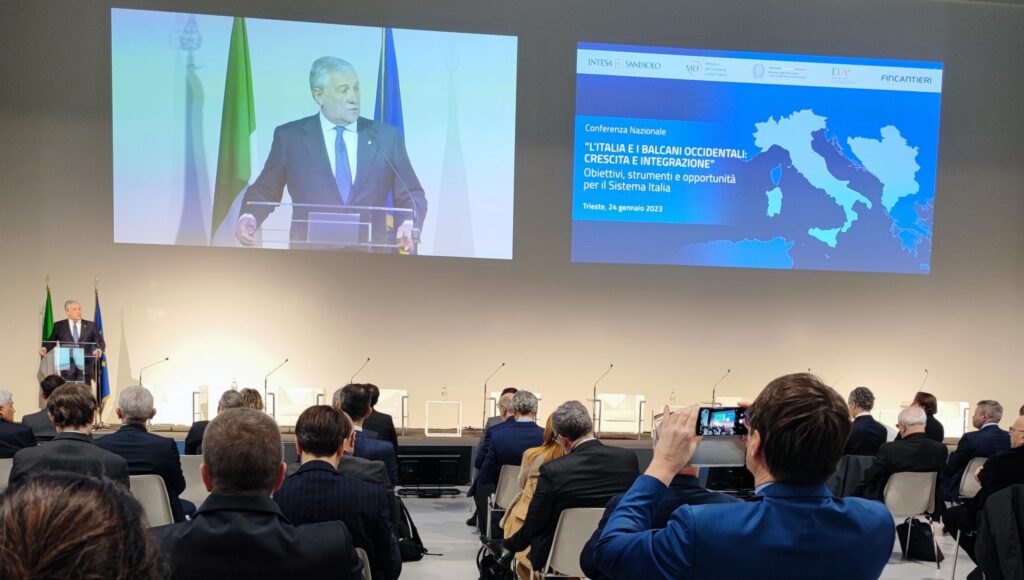The Italy-Serbia Business & Science Forum was held in Belgrade last Tuesday and Wednesday with the participation of 250 Italian and 150 Serbian companies. The attendance by Italy’s Foreign Minister Mr. Antonio Tajani and Minister of Research Mrs. Anna Maria Bernini was corresponded on the Serbian side not only by that of their homologue ministers but also by that of the President Mr. Aleksandar Vučić and the Prime Minister Mrs. Ana Brnabić. This made the significance of the event to go beyond the economic dimension to assume a political meaning. The presence of 1,200 Italian companies active in Serbia together with the giants Intesa, Unicredit, Generali and Stellantis (which will produce the electric model of Panda in its Kragujevac plant after its shutdown following the merger of FCA with PSA) is part of the explanation for a commercial exchange in constant growth, which has reached 4.5 billion euros and which places Italy as the third commercial partner of the Country and second investor after Germany. As are part of the explanation the incentives put in place by the Serbian government to attract foreign investments, the free trade agreements with non-European states and the charm of Belgrade, one of the most vibrant capitals in Europe.
The Forum follows the mission of Minister Tajani together with Italy’s Minister of Defense Mr. Guido Crosetto to Belgrade and Pristina last November to defuse the “license plate crisis” between Serbia and Kosovo, the participation of the Prime Minister Mrs. Giorgia Meloni to the EU-Western Balkans summit in Tirana last December and the Trieste conference of last January with the six Western Balkan countries. The Rome conference with the foreign ministers of the six countries will follow in April.
The Forum is therefore one of the stages of a process defining a new Italian activism in a vital but unstable region. The crux of instability remains Kosovo, a former Serbian province that Belgrade lost in 1999 following NATO intervention (the anniversary was celebrated on Friday with demonstrations throughout Serbia) and whose sovereignty it does not recognize along with a hundred of States including Russia, China and five EU members. In Kosovo there are dozens of Serbian monasteries, four of which are UNESCO heritage sites, and there is Prizren, the capital of the ancient Serbian empire. And there are the Albanians, who have inhabited the region for centuries and who today make up more than 90% of the population. Italy’s two best friends in the region are also its leading nations: Serbia and Albania, another pole of attraction for many Italian companies. “Italy has never been among those who have put heavy pressure on Serbia,” said Vučić, referring to the Franco-German agreement proposal between Belgrade and Pristina. This is also why Italy can play an important role in the definition of a regional framework for peace and stability.
On the Serbian side, friendship with Italy goes beyond the policy of neutrality pursued by Vučić since his rise to power in 2014 and confirmed after Russia’s aggression to Ukraine. A nation sentimentally linked to its Russian Orthodox Slavic brothers, Serbia has not joined the sanctions against Moscow despite condemning Russia’s annexation of Ukrainian territories. Such recognition would undermine the principle of the states’ territorial integrity, an indispensable legal basis for justifying the continued rejection of Kosovo’s independence. Belgrade needs Russian support. Putin reciprocates Vučić ‘s non-compliance with the sanctions by supplying gas and weapons at a discounted price to Serbia, which also hosts a “humanitarian center” that according to some would hide a Russian military base. Serbian neutrality is also expressed through the purchase of Chinese drones and the excellent relations of Vučić with Turkey’s president Recep Tayyip Erdogan.
The success of the event organized by Italy’s enterprising ambassador in Belgrade, Mr. Luca Gori, is testified by the fact that his French colleague took it as a pretext to announce the envoy by Paris of energy and technology experts to act as advisers to the Serbian government. Not really a demonstration to be willing to lift the paternalistic attitude Wester powers have too often applied in the region.
Source: Serbian Monitor


